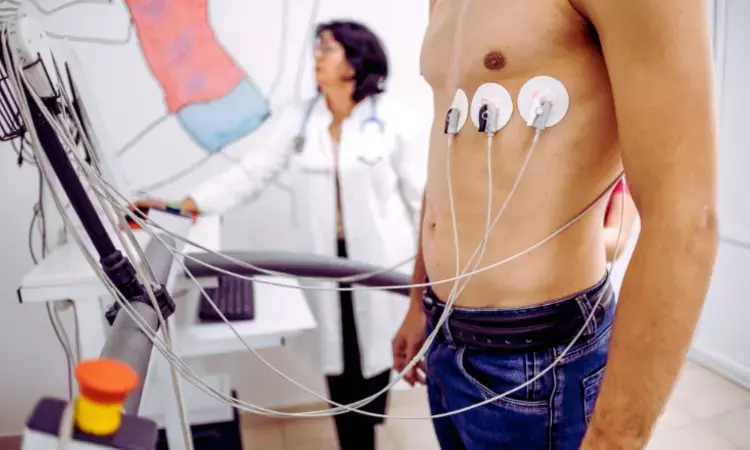- Home
- Medical news & Guidelines
- Anesthesiology
- Cardiology and CTVS
- Critical Care
- Dentistry
- Dermatology
- Diabetes and Endocrinology
- ENT
- Gastroenterology
- Medicine
- Nephrology
- Neurology
- Obstretics-Gynaecology
- Oncology
- Ophthalmology
- Orthopaedics
- Pediatrics-Neonatology
- Psychiatry
- Pulmonology
- Radiology
- Surgery
- Urology
- Laboratory Medicine
- Diet
- Nursing
- Paramedical
- Physiotherapy
- Health news
- Fact Check
- Bone Health Fact Check
- Brain Health Fact Check
- Cancer Related Fact Check
- Child Care Fact Check
- Dental and oral health fact check
- Diabetes and metabolic health fact check
- Diet and Nutrition Fact Check
- Eye and ENT Care Fact Check
- Fitness fact check
- Gut health fact check
- Heart health fact check
- Kidney health fact check
- Medical education fact check
- Men's health fact check
- Respiratory fact check
- Skin and hair care fact check
- Vaccine and Immunization fact check
- Women's health fact check
- AYUSH
- State News
- Andaman and Nicobar Islands
- Andhra Pradesh
- Arunachal Pradesh
- Assam
- Bihar
- Chandigarh
- Chattisgarh
- Dadra and Nagar Haveli
- Daman and Diu
- Delhi
- Goa
- Gujarat
- Haryana
- Himachal Pradesh
- Jammu & Kashmir
- Jharkhand
- Karnataka
- Kerala
- Ladakh
- Lakshadweep
- Madhya Pradesh
- Maharashtra
- Manipur
- Meghalaya
- Mizoram
- Nagaland
- Odisha
- Puducherry
- Punjab
- Rajasthan
- Sikkim
- Tamil Nadu
- Telangana
- Tripura
- Uttar Pradesh
- Uttrakhand
- West Bengal
- Medical Education
- Industry
Stress Imaging Outperforms ECG in Predicting Cardiac Events, ISCHEMIA Trial Finds

USA: In a recent study published in JACC: Cardiovascular Imaging, researchers from the ISCHEMIA trial have highlighted how different forms of stress testing — including stress imaging and exercise electrocardiography (ECG) — offer varied prognostic insights in patients with chronic coronary syndromes (CCS). Led by Dr. Leslee J. Shaw from the Icahn School of Medicine at Mount Sinai, the analysis offers updated evidence on the ability of these diagnostic tools to predict cardiovascular outcomes.
The ISCHEMIA (International Study of Comparative Health Effectiveness with Medical and Invasive Approaches) trial enrolled 5,179 patients across 320 global centers, each with moderate-to-severe stable coronary artery disease. Participants underwent different types of stress tests — nuclear imaging (2,567 patients), echocardiography (1,085), cardiac magnetic resonance imaging or CMR (257), and exercise ECG (1,270). Using Cox proportional hazards models, the researchers evaluated the associations between various stress test findings and key cardiovascular events.
The primary endpoint included cardiovascular (CV) death, myocardial infarction (MI), resuscitated cardiac arrest, or hospitalization due to unstable angina or heart failure. Additional endpoints included CV death alone, spontaneous MI, procedural MI, and type 2 MI.
The study led to the following findings:
- A higher number of scarred heart segments was significantly linked to an increased risk of the composite primary endpoint (HR: 1.07).
- Lower left ventricular ejection fraction (LVEF) at rest (HR: 0.88) and during stress (HR: 0.87) were strong predictors of adverse cardiovascular outcomes.
- Echocardiography and nuclear imaging showed predictive value across several cardiovascular endpoints.
- The extent of ischemia identified on stress cardiac magnetic resonance imaging (CMR) was a strong predictor of the composite primary endpoint and spontaneous myocardial infarction.
- Exercise ECG showed limited predictive ability compared to imaging tests.
- The number of ischemic segments was significantly associated with both spontaneous and procedural myocardial infarctions but was only borderline significant for predicting the composite primary endpoint.
The research suggests that while all forms of stress testing provide prognostic information, their predictive accuracy differs based on the modality and the endpoint considered. Stress CMR, in particular, emerged as a valuable tool, potentially warranting broader use in evaluating patients with stable coronary artery disease.
"The ISCHEMIA trial, conducted across 320 centers worldwide, demonstrated that stress imaging and exercise ECG varied in their ability to predict major cardiovascular outcomes, helping to uncover distinct risk patterns associated with ischemia and infarction. Among the different modalities, stress CMR stood out as a strong predictor of multiple clinical endpoints, indicating its value in patient assessment," the researchers wrote.
"These findings emphasize the need for individualized diagnostic strategies and support the growing role of advanced imaging in guiding treatment decisions for patients with chronic coronary syndromes," they concluded.
Reference:
Shaw LJ, Phillips LM, Leipsic J, et al. Comparative prognosis by stress ECG and stress imaging: results from the ISCHEMIA trial. JACC Cardiovasc Imaging. 2025;Epub ahead of print.
Dr Kamal Kant Kohli-MBBS, DTCD- a chest specialist with more than 30 years of practice and a flair for writing clinical articles, Dr Kamal Kant Kohli joined Medical Dialogues as a Chief Editor of Medical News. Besides writing articles, as an editor, he proofreads and verifies all the medical content published on Medical Dialogues including those coming from journals, studies,medical conferences,guidelines etc. Email: drkohli@medicaldialogues.in. Contact no. 011-43720751


